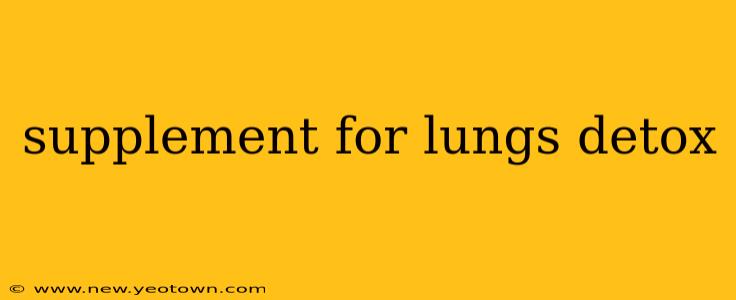The air we breathe is full of unseen particles – pollutants, allergens, and even microscopic irritants. Over time, these can accumulate in our lungs, impacting respiratory health. While a true "lung detox" isn't scientifically recognized in the same way as a liver or kidney detox, supporting your lungs' natural cleansing processes is crucial for optimal respiratory function. This involves a holistic approach, and supplements can play a beneficial role as part of a larger strategy. Let's explore how.
What is a Lung Detox?
Before diving into supplements, it's important to clarify the concept of a "lung detox." The lungs possess a remarkable self-cleaning mechanism. Through tiny hair-like structures called cilia, and the production of mucus, the lungs effectively trap and expel foreign particles. However, environmental factors and lifestyle choices can overwhelm this system. A "lung detox" typically refers to strategies aiming to bolster the lungs' natural ability to clear these accumulated substances. This includes lifestyle changes like quitting smoking, reducing exposure to pollutants, and supporting lung function through diet and targeted supplementation.
What Supplements Can Support Lung Health?
Several supplements show promise in supporting lung health. However, it's vital to remember that these are not magic bullets. They are most effective when combined with a healthy lifestyle that includes regular exercise, a balanced diet rich in antioxidants, and minimizing exposure to environmental toxins.
N-Acetylcysteine (NAC):
NAC is a precursor to glutathione, a powerful antioxidant that plays a significant role in protecting cells from damage, including within the lungs. Some studies suggest that NAC might help thin mucus and improve lung function in individuals with certain respiratory conditions. However, more research is needed to confirm these benefits definitively.
Vitamin C:
A potent antioxidant, Vitamin C helps neutralize free radicals that can damage lung tissue. It's crucial for maintaining a robust immune system, which is essential for fighting off respiratory infections. Consuming Vitamin C-rich foods is beneficial, but supplementation may be considered if dietary intake is insufficient.
Vitamin D:
Emerging research suggests a link between Vitamin D deficiency and an increased risk of respiratory infections and poorer lung function. Adequate Vitamin D levels may support the immune system and reduce the susceptibility to respiratory illnesses. It's always best to get your Vitamin D levels checked before supplementing.
Ginger:
Traditionally used to soothe coughs and ease respiratory discomfort, ginger possesses anti-inflammatory properties that may help reduce irritation in the airways. Consuming ginger in food or tea form might provide some relief.
Do Lung Detox Teas Work?
Many herbal teas are marketed for "lung detox." While some herbs, like ginger and licorice root, possess properties that may support respiratory comfort, scientific evidence directly linking these teas to a significant "lung detox" effect is limited. These teas might offer soothing benefits, but they shouldn't be considered a primary treatment for any respiratory condition.
Are There Any Side Effects of Lung Detox Supplements?
As with any supplement, potential side effects exist. It's crucial to consult your doctor before starting any new supplement regimen, particularly if you have pre-existing health conditions or are taking other medications. Some supplements might interact with medications or exacerbate certain health issues.
What Are the Best Practices for Lung Health?
Supplements can be a supporting piece of the puzzle, but lifestyle changes are paramount for optimal lung health.
Quit Smoking:
This is arguably the most crucial step. Smoking is the leading cause of lung disease.
Reduce Exposure to Pollutants:
Minimize exposure to air pollution, dust, and other irritants.
Stay Hydrated:
Drinking plenty of water helps thin mucus and makes it easier for the lungs to clear debris.
Eat a Healthy Diet:
Consume a diet rich in fruits, vegetables, and whole grains.
Conclusion: Supplements and a Holistic Approach
While supplements might support lung health, they shouldn't replace a healthy lifestyle. Prioritize quitting smoking, minimizing environmental exposure, eating well, and staying hydrated. Consult your healthcare provider before using any supplements, particularly if you have pre-existing medical conditions or take other medications. By focusing on a comprehensive approach, you can proactively support your respiratory system and help it work efficiently. Remember, true lung health is a journey of proactive lifestyle choices rather than a quick fix.

